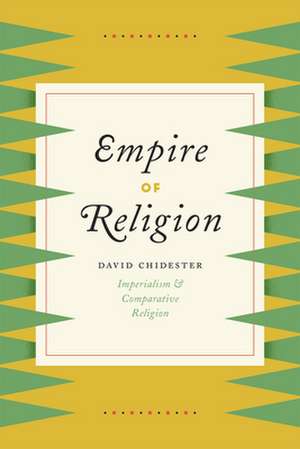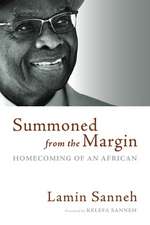Empire of Religion: Imperialism and Comparative Religion
Autor David Chidesteren Limba Engleză Paperback – 20 mar 2014
How is knowledge about religion and religions produced, and how is that knowledge authenticated and circulated? David Chidester seeks to answer these questions in Empire of Religion, documenting and analyzing the emergence of a science of comparative religion in Great Britain during the second half of the nineteenth century and its complex relations to the colonial situation in southern Africa. In the process, Chidester provides a counterhistory of the academic study of religion, an alternative to standard accounts that have failed to link the field of comparative religion with either the power relations or the historical contingencies of the imperial project.
In developing a material history of the study of religion, Chidester documents the importance of African religion, the persistence of the divide between savagery and civilization, and the salience of mediations—imperial, colonial, and indigenous—in which knowledge about religions was produced. He then identifies the recurrence of these mediations in a number of case studies, including Friedrich Max Müller’s dependence on colonial experts, H. Rider Haggard and John Buchan’s fictional accounts of African religion, and W. E. B. Du Bois’s studies of African religion. By reclaiming these theorists for this history, Chidester shows that race, rather than theology, was formative in the emerging study of religion in Europe and North America. Sure to be controversial, Empire of Religion is a major contribution to the field of comparative religious studies.
In developing a material history of the study of religion, Chidester documents the importance of African religion, the persistence of the divide between savagery and civilization, and the salience of mediations—imperial, colonial, and indigenous—in which knowledge about religions was produced. He then identifies the recurrence of these mediations in a number of case studies, including Friedrich Max Müller’s dependence on colonial experts, H. Rider Haggard and John Buchan’s fictional accounts of African religion, and W. E. B. Du Bois’s studies of African religion. By reclaiming these theorists for this history, Chidester shows that race, rather than theology, was formative in the emerging study of religion in Europe and North America. Sure to be controversial, Empire of Religion is a major contribution to the field of comparative religious studies.
| Toate formatele și edițiile | Preț | Express |
|---|---|---|
| Paperback (1) | 302.93 lei 6-8 săpt. | |
| University of Chicago Press – 20 mar 2014 | 302.93 lei 6-8 săpt. | |
| Hardback (1) | 684.45 lei 6-8 săpt. | |
| University of Chicago Press – 19 mar 2014 | 684.45 lei 6-8 săpt. |
Preț: 302.93 lei
Nou
Puncte Express: 454
Preț estimativ în valută:
57.97€ • 62.95$ • 48.70£
57.97€ • 62.95$ • 48.70£
Carte tipărită la comandă
Livrare economică 23 aprilie-07 mai
Preluare comenzi: 021 569.72.76
Specificații
ISBN-13: 9780226117430
ISBN-10: 022611743X
Pagini: 400
Dimensiuni: 152 x 229 x 25 mm
Greutate: 0.53 kg
Editura: University of Chicago Press
Colecția University of Chicago Press
ISBN-10: 022611743X
Pagini: 400
Dimensiuni: 152 x 229 x 25 mm
Greutate: 0.53 kg
Editura: University of Chicago Press
Colecția University of Chicago Press
Notă biografică
David Chidester is professor of religious studies and director of the Institute for Comparative Religion in Southern Africa at the University of Cape Town. He is the author or editor of more than twenty books, including the award-winning Savage Systems: Colonialism and Comparative Religion in South Africa. He lives in South Africa.
Cuprins
Preface
1. Expanding Empire
2. Imperial, Colonial, and Indigenous
3. Classify and Conquer
4. Animals and Animism
5. Myths and Fictions
6. Ritual and Magic
7. Humanity and Divinity
8. Thinking Black
9. Spirit of Empire
10. Enduring Empire
Notes
Index
1. Expanding Empire
2. Imperial, Colonial, and Indigenous
3. Classify and Conquer
4. Animals and Animism
5. Myths and Fictions
6. Ritual and Magic
7. Humanity and Divinity
8. Thinking Black
9. Spirit of Empire
10. Enduring Empire
Notes
Index
Recenzii
“Chidester renders highly original readings of major figures like Max Müller, Charles Darwin, James Frazer, Herbert Spencer, E. B. Tylor, and W. E. B. Du Bois. . . . By foregrounding the complex apparatuses of imperialism, racialization histories, and the imbrication of racial knowledge with colonial power, Chidester offers a game-changing volume that will shift scholarly understanding of empire and religion. . . . Essential.”
“Chidester makes vivid his story by focusing on important figures in the discipline, including Friedrich Max Müller, E.B. Tyler, Andrew Lang, James Frazer, and W.E.B. DuBois. Even H. Rider Haggard and Mohandas Gandhi also figure in this genealogy. . . . Chidester’s critical analysis of how the early scholars navigated their cultural heritage suggest lessons modern scholars might consider.”
“There is a growing body of scholarship that explores the complex relations between European imperialism and the modern field of comparative religion, but Empire of Religion is the first to really interrogate the relations between colonial Africa and the modern study of religion in a comprehensive and sophisticated way. Elegantly pairing key themes and authors in each section, Chidester’s lucid and powerful book will be of central importance to specialists in African religions and history, and the larger genealogy of religion as a modern category.”
“Here, for perhaps the first time, is a genuinely empirical study of the empire of religion. Chidester doesn’t merely name a genealogy and geography of power, he proves it in the form of triple mediations that spin out from a very specific place, South Africa. Moving restlessly between the accounts of local actors, colonial officials and, most importantly, metropolitan theoreticians, Chidester ‘doggedly’ (see the book!) disentangles the dubious series of transactions and translations that generated the fetish called theory, and exposes its imperial encumbrances.”
“Brilliantly illustrates the epistemological perils associated both with positing the insider as a “mystical postulate of authenticity” . . . on the one hand, and with conferring objectivity to outsider status as though it could neatly erase tacit realities of privilege, power, and (in this case) empire, on the other. . . . Essential reading for graduate students and professional scholars.”
“Chidester productively treats the famous scholars of religion as unintentional informants to their peculiar, imperial, and metropolitan society. . . . [His] discussion on the production, authorization and circulation of knowledge about religion is instructive. . . . The reader also encounters many fascinating themes, one and each worthy of an extensive article.”
“This book challenges scholars of any field that relies on comparison—who do we cite and what counts as evidence and as expertise? It lays bare the incestuous acts of scholarly citation and recitation by reminding us of the materiality, multiple meanings, and power relations of cultural encounters in Africa.”
“A singularly erudite book and a signal contribution to the burgeoning literature in the field of African comparative religion and missionary history.”
"The story Chidester tells, however, is much more interesting and complex than a simple description of knowledge and scholarship as tools of colonial domination. Instead, he traces what he calls the “triple mediation” of imperial, colonial, and indigenous agents, sources, and voices in the creation of knowledge about religion."










